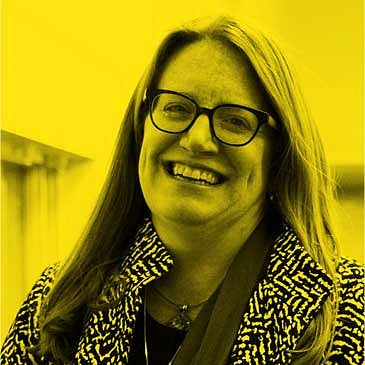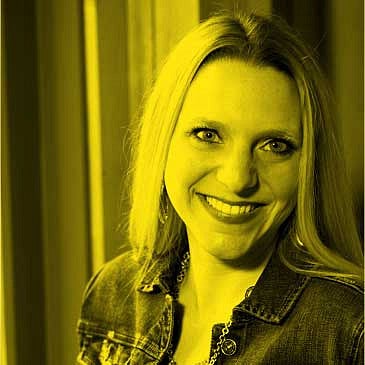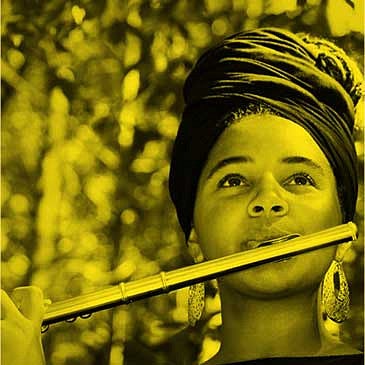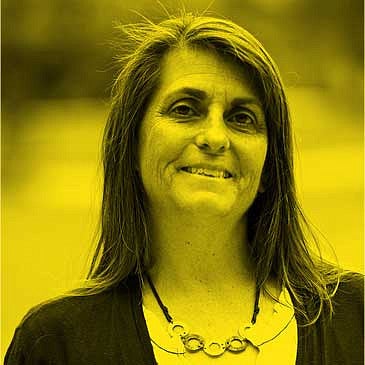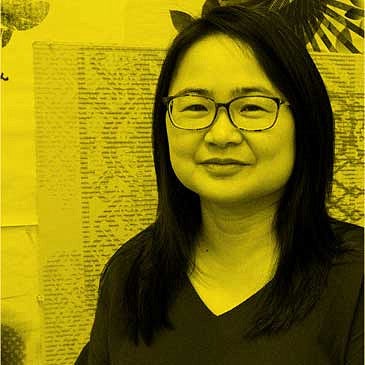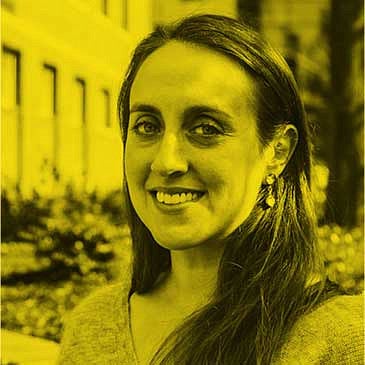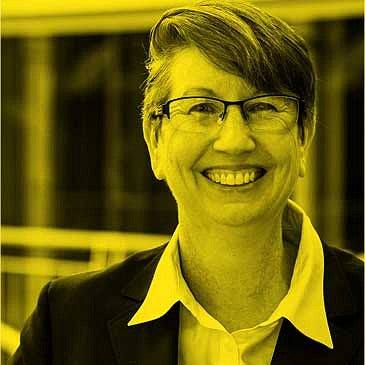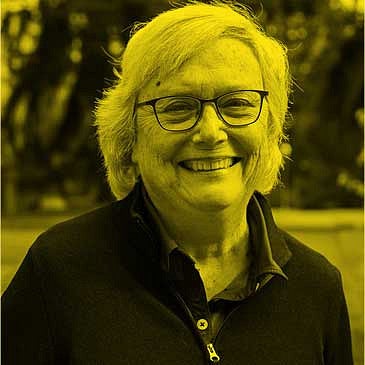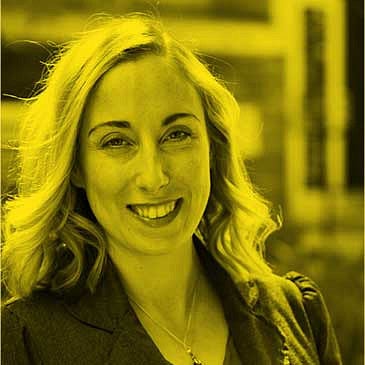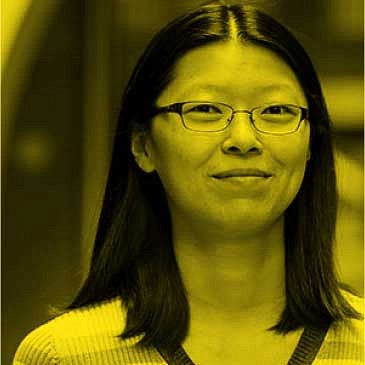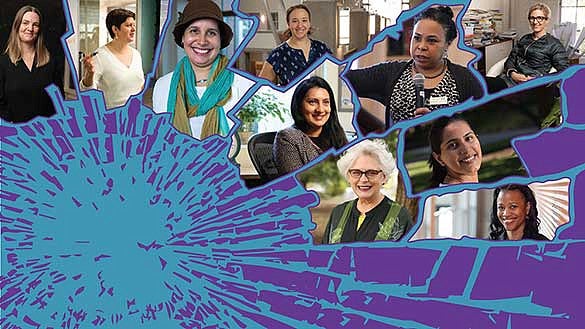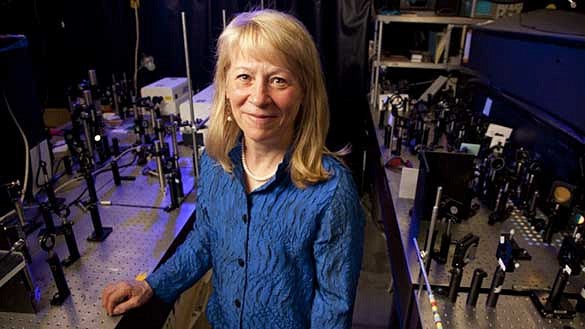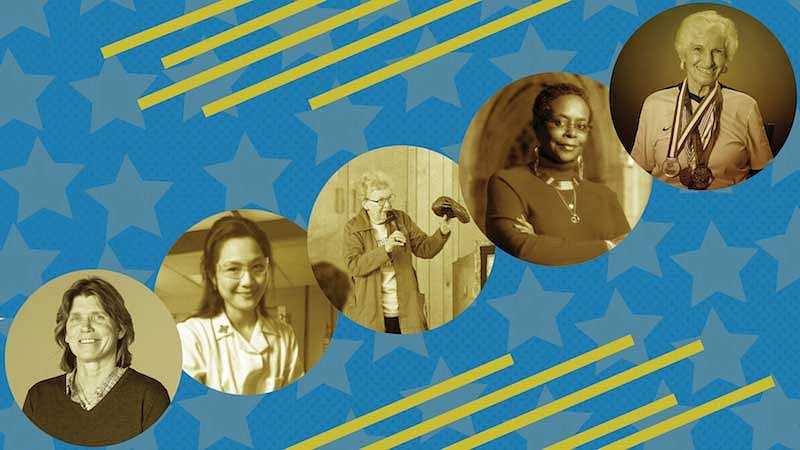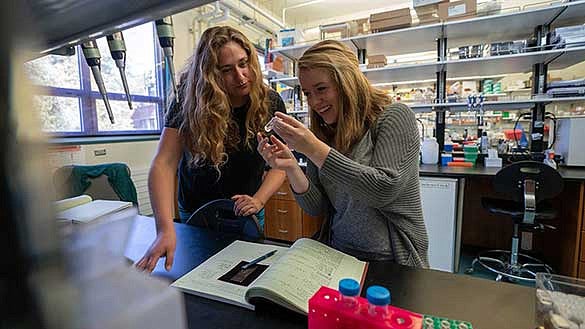To commemorate Women’s History Month 2020, join us in celebrating 10 extraordinary UO faculty members—a roster of shining stars from a diversity of disciplines and backgrounds who are guiding the next generation to equity, opportunity, and excellence.
Marking the 100th anniversary of passage of the 19th Amendment, giving some women the right to vote, Women’s History Month 2020 celebrates the courageous women who marched and sacrificed to make their voices heard and today’s women in government who are reshaping the leadership landscape.
In Oregon, as well as on the national and international stage, tenacious women from all walks of life have cleared a path for future generations.
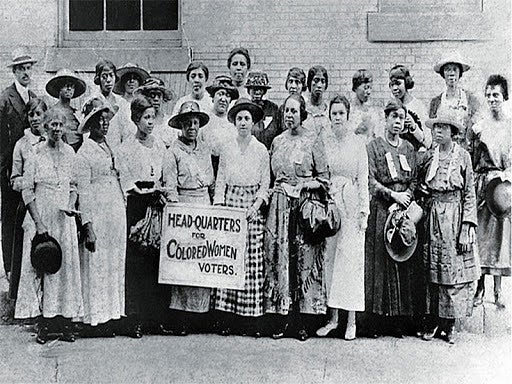
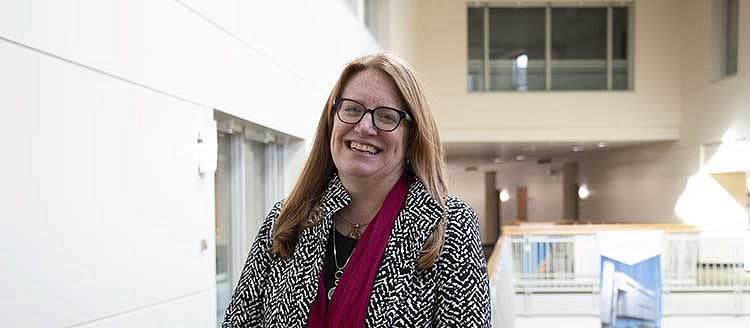
Adell Amos
Clayton R. Hess Professor of Law, Environmental and Natural Resource Law Center
School of Law
Collegiality. Self-Discovery. Mentorship. To Adell Amos, associate dean for academic affairs at the School of Law and Clayton R. Hess professor of law at the Environmental Natural Resource Law Center, these values have been key to her personal and professional success.
When Amos attended Oregon Law in 1998, she points to a cohort of women who made the difference. “We didn’t just study together, but we held each other up in so many ways,” said Amos. “All the challenges and victories we faced as we navigated professional school taught me how I wanted to approach my new profession and the work I wanted to do in the world.”
It is this supportive environment that Amos now creates for her students. “Everyone learns differently,” she said. “I tell my students that when you can stop comparing yourself to those around you and really focus on how you learn, then you start to engage your education for your purposes.”
These lessons and her mentorship are changing the lives of her students.
“Professor Amos is genuinely invested in our success,” said Grace Brahler, a fellow who works with Amos in the law school’s Oceans, Coasts and Watersheds Project. “She teaches us to be mindful about where we spend our energy and how we use our privilege and skills to support others.”

Erin Beck
Associate Professor
Department of Political Science
College of Arts and Sciences
“The biggest inspirations for my career have been the resilient, creative, and generous Guatemalan women I have met through my research,” said Erin Beck, associate professor of political science in the College of Arts and Sciences. “Learning from them has pushed me to do research that honors their expertise and their efforts to create a more just society—oftentimes in quite difficult circumstances.”
Recently awarded a grant from the Harry Frank Guggenheim Foundation with her coauthor, Beck conducts research on international development and violence against women; she is especially interested in how gender, race, and class considerations intersect. In her analysis of indigenous Guatemalan women’s experiences of gendered violence, she finds that they are inadequately served by interventions that do not also account for class, place, or ethnic-based inequalities.
When it comes to teaching, Beck asserts “Passion is contagious! I find that showing students why I get excited about the topics I am teaching—and spelling out how seemingly abstract ideas and policies affect real people in meaningful ways—motivates students to dig deeper.”
In addition to her academic work, Beck is on the board of a local dog rescue and regularly serves as an expert witness in asylum cases for Guatemalans fleeing conditions of violence in their home country.
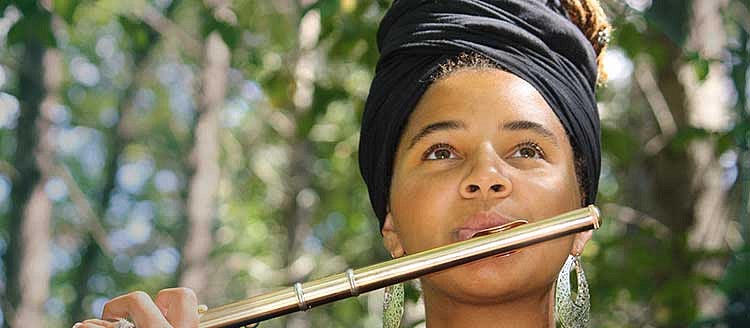
Jacqueline Cordova-Arrington
Assistant Professor of Flute
School of Music and Dance
As a recipient of the William D. Ford Fulbright Grant, School of Music and Dance Assistant Professor of Flute Dr. Jacqueline Cordova-Arrington was the first American to study extensively with principal flutist of the Berlin Philharmonic, Andreas Blau, who inspired her to not only achieve excellence in performance, but to also share that excellence as an educator.
“I think what inspired me most about the Berlin Philharmonic, is the organization’s balance of high-level performance and education. I realized that I had to be the best musician I could be, to be a good educator.”
In her studio, where she teaches a variety of courses to students with diverse career interests—music majors and non-majors alike—Cordova-Arrington encourages her students to meticulously pursue fundamentals that will allow them the freedom to make informed, creative decisions.
“Even though I know the students that I teach will go on to pursue different career paths, I teach them to always work with integrity and excellence in whatever they do.”
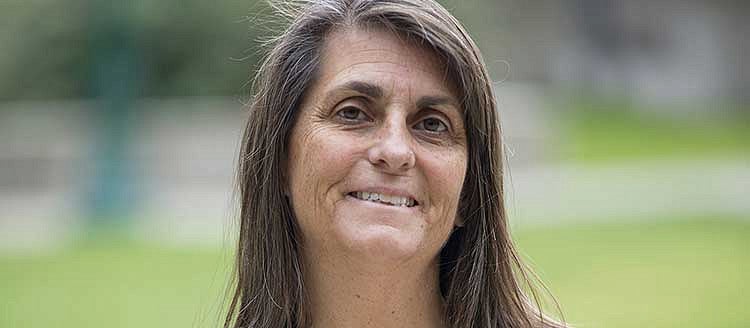
Lillian Duran
Associate Dean for Academic Affairs
Associate Professor of Special Education and Clinical Sciences
College of Education
Growing up in an immigrant family with Mexican and German parents who never completed high school, Lillian Duran has always had to chart her own path, trust her gut instincts, and keep an eye out for what might be missing.
“I ask questions. I try to find solutions,” she said about her personal guiding philosophies. “It really begins in my roots.”
Duran is an associate professor of special education and clinical sciences and the associate dean for academic affairs in UO’s College of Education. Earlier in her career as a special education teacher in Minnesota, Duran discovered that 40 percent of public-school students in rural parts of that state were native Spanish speakers. Yet, she characterized the interpreters hired by the school districts as ”poorly trained,” the academic assessments were all in English, and the evaluations of these students were funneled through a deficit-based perspective. Duran was also the only teacher in nine rural school districts who spoke Spanish.
“I wanted to help my people,” Duran explained. “As a teacher, I was seeing the mismatch and really, the civil-rights violations that were happening.”
Duran’s resourcefulness in addressing this systemic issue led to a research focus on improving instructional and assessment practices for preschool, dual-language learners. She is also inspiring other researchers across the country to improve educational assessment practices for students in the Chinese, Russian, and Vietnamese communities. And every fall, she mentors about a dozen UO students to learn how to work with children with disabilities who live in three cities in Mexico.
“We’re not just showing up to a job,” Duran explained. “Every day, our job changes lives for the better. I want to make this central to the work we do.”
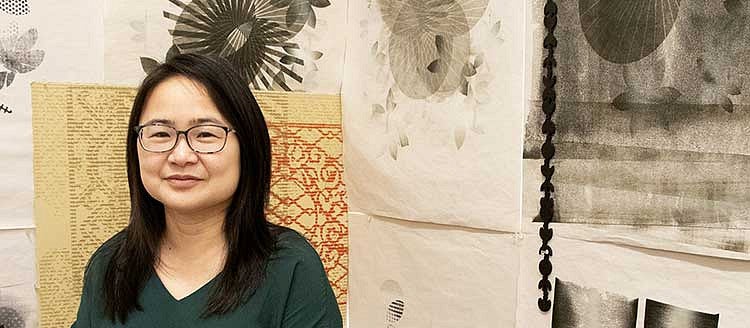
Charlene Liu
Associate Dean
Interim Director of School of Art + Design
College of Design
When Charlene Liu, associate dean at the College of Design and interim director at the School of Art + Design, was an undergraduate art student one of her professors, who she said, “taught printmaking with a fluid and experimental approach,” had a strong influence on her creative path. She also introduced Liu to the works of many inspiring women artists, including Rina Banerjee, Ellen Gallagher, Polly Apfelbaum, Florine Stettheimer, and the surrealist works of Remedios Varo and Leonora Carrington.
She also drew inspiration after college from a close-knit group of artists who helped one another make the move from school to a creative life in New York City. “Together we built studios in industrial spaces, shared opportunities for jobs and exhibitions, and introduced artists and curators.”
Today, Liu pays it forward with her own students by encouraging them to foster skills and creative connections that will help them build a sustainable creative practice after graduation.
“I often employ studio assistants to help produce my creative work for an exhibition. They learn advanced techniques and how to manage deadlines and budgets,” she said. “These experiences have a positive impact on their studio practice and give them insights into the professional practices of an artist.”
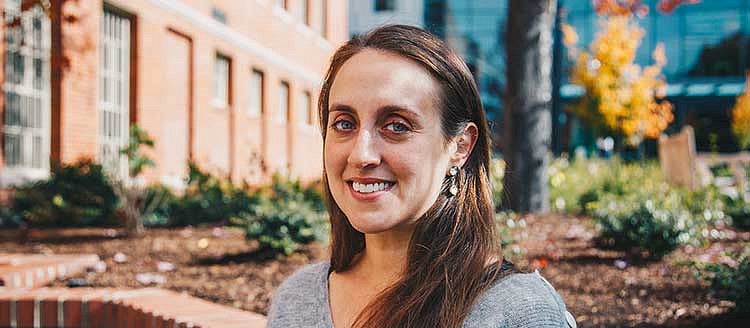
Carol Paty
Associate Professor
Department of Earth Sciences
Clark Honors College
For Clark Honors College Associate Professor of Earth Sciences Carol Paty, a member of the NASA team launching the Europa Clipper—a spacecraft that will conduct a detailed survey of Jupiter’s icy moon Europa to determine if the conditions there are suitable for life—a pivotal moment in her career arrived in the lead-up before the instrument selection for the mission.
“The instrument proposal teams were forming, and within a few months I had the incredible experience of being asked to join several instrument teams,” she said. “The proposals were a tremendous effort to assemble, but somewhere through the dizzying number of proposal drafts and telecons I realized that I was considered an expert in my field, and that my input was not only credible but also valued.”
Paty’s expertise in the study of icy moon-magnetosphere interactions provided a path onto Trident, a mission proposal to study Neptune’s moon Triton, which was just selected as one of NASA’s four possible Discovery missions. As a co-Investigator on Trident she will be working with an international team of scientists and engineers over the next nine months to put together a mission concept study for the final Discovery mission sections next year.
Although her field hasn’t always been hospitable to women Paty said she has drawn inspiration from her colleagues, a list of Who’s Who in the field of space research.
“In my field of research, I would say that Michelle Thomsen (a senior scientist at the Planetary Science Institute at Los Alamos) and Margy Kivelson (Distinguished Professor of Space Physics, Emerita, in the Department of Earth and Space Sciences at UCLA) have loomed large as role models throughout my career,” she said. “In terms of space missions in general, I am grateful for the leadership of Linda Spilker (Cassini Project Scientist) and Bob Pappalardo (Europa Clipper) and their dedication to making mission teams inclusive environments at all levels. “
Whether she is advising graduate research or participating in academic advising at the undergraduate level, Paty feels it is critical to empower and support students to define the path that interests and inspires them.
“Students become truly vested in positive outcomes when they have that freedom to develop and grow,” she said, “and their sense of achievement and confidence is far greater when they have the opportunity to play a prominent role in defining their path to success.”
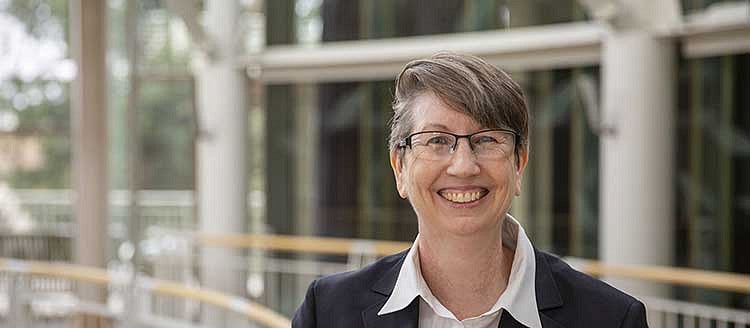
Stephanie Peel
Professor of Practice
School of Accounting
Lundquist College of Business
Although teaching at the university level was a long-term professional goal, for Stephanie Peel, professor of practice and Porter Faculty Fellow at the Lundquist College of Business, her path to the UO wasn’t a traditional one.
For the past 30 years Peel has worked at PricewaterhouseCoopers. “I’ve worked in every part of the business,” she said of her time at PwC. “Audit work, advisory work, two years in Manhattan for PwC’s learning and education crew—where I ran a project completely changing the approach to teaching audit methodology for third year associates.”
But after stints in California and New York, and working remotely for PwC, Peel reflected on her aging parents, and she and her wife decided to move back to Oregon. While networking at the PwC Portland office she was introduced to Senior Associate Dean Angela Davis and Robin Clement, director of the UO Master of Accounting program.
They were looking for someone to teach analytics for accountants, and Peel had that skillset.
“In my career, there have been pivotal people at so many different steps along the way,” Peel said. “There were several people who gave critical advice, took an interest, or carved a path for me. Sometimes it’s the least expected person or the least expected thing that you take to heart—and it changes the way you do things.”
Peel provides critical advice and guidance to her own students, encouraging them to pursue a path in accounting. “It’s not just knowing the tax code forward and backward,” she said. “It’s everything from being able to go and tour amazing businesses and come to an understanding of what their strategy is and how they do what they do, to being a sort of caped crusader fighting corruption and fraud.”
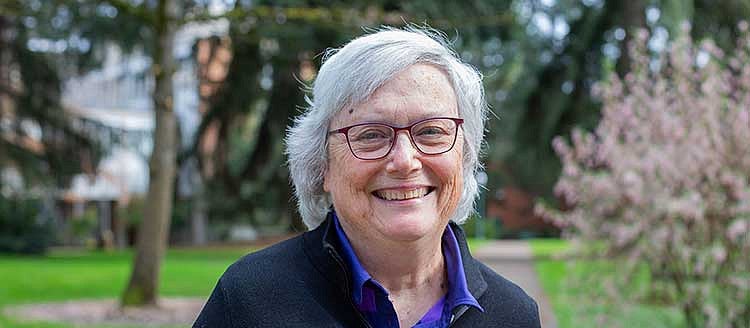
Janet Rose
Senior Instructor
Department of Theatre Arts
College of Arts and Sciences
Janet Rose—who has been at the UO since 1987 and has been involved in more than 100 productions—is a senior instructor in the College of Arts and Sciences, Department of Theatre Arts, specializing in lighting, stage management, and theatrical production. Her favorite spot on campus is backstage at the Robinson Theatre where she thrives on the energy of student productions, “from the actors portraying their roles, to the technicians flying and moving scenery, to the students helping costume quick changes—they put so much heart into what they’re doing,” she said.
Rose’s role models include two legendary lighting designers—Jean Rosenthal (“the mother of lighting design”) and Tharon Musser (who designed A Chorus Line and other groundbreaking musicals)—who prevailed in a male-dominated field to achieve reputations as among the best designers on Broadway.
As a teacher and mentor, she is especially gratified when her students have rewarding experiences that inspire them to continue work in theater, and more generally gain appreciation for how theatre can positively affect their lives.
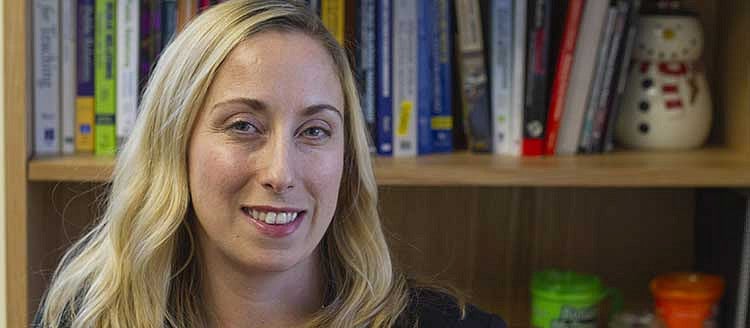
Autumn Shafer
Assistant Professor of Public Relations
School of Journalism and Communication
Autumn Shafer is more than just a public relations professor in the School of Journalism and Communication. She’s a researcher, communicator, mentor, and determined advocate for her students.
Shafer’s mission to educate and mentor is deeply rooted in her life experience. When she was eight years old, her family was homeless, and school became her safe space. Today she aims to create that same feeling of security for her students in the classroom.
“For my undergraduate students, I remind them that there are many paths to success—that it is okay to try new things and have many passions,” Shafer said. “For my graduate students, I foster an environment where students can work collaboratively to celebrate and create success for each other.”
Shafer especially enjoys research. She specializes in health communication and works to educate the public about such issues as cancer prevention, condom use, and vaccination. Right now, she is working with Oregon Health Sciences University on the Healthy Oregon Project, which aims to identify and educate the 1–2 percent of Oregonians who have a genetic risk for cancer but don’t know it. She is also working with OHSU on a statewide campaign to raise awareness about skin cancer detection.
When asked how she has achieved her goals, Shafer is quick to give credit where it’s due.
“It has always been through some combination of important people in my life supporting and inspiring me—and a strong internal drive to learn and achieve,” she said.
Listen to Autumn Shafer’s interview on Women’s History Month.
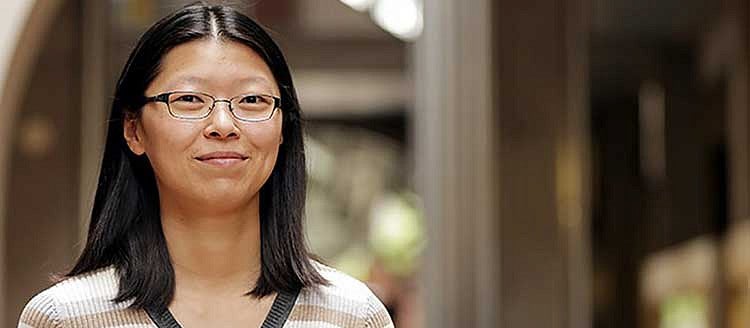
Cathy Wong
Assistant Professor
Department of Chemistry and Biochemistry
College of Arts and Sciences
To what lengths will Department of Chemistry and Biochemistry Assistant Professor Cathy Wong go for her science? As a graduate student, Wong once packed up her toothbrush and overnight bag and lived in her lab for a week to monitor an experiment that required her to take frequent measurements—meaning that she could sleep in only 40-minute intervals.
Was it worth the effort? Absolutely, she said. “Even though it is difficult, frequently frustrating, and oftentimes a bit scary—since there is no guarantee of success—it can be incredibly rewarding to do hard science that lets us observe something completely new.”
As a mentor to her own students in the College of Arts and Sciences, Wong is inspired by the many senior female faculty members in her department—including Geri Richmond, Marina Guenza, Diane Hawley, Vickie De Rose, and Cathy Page—whom she credits with paving the way for junior faculty like herself.
She is faculty sponsor for a student group called a Community for Minorities in STEM (CMiS) and runs another program called Peer Recruitment in Science and Math (PRiSM)—both of which are directed at improving retention for underrepresented minority graduate students in STEM departments.
“It’s really a privilege to be able to spend my time trying to add a few new pixels to our picture of how the world works,” said Wong, who received a prestigious National Science Foundation Career Award in 2018.
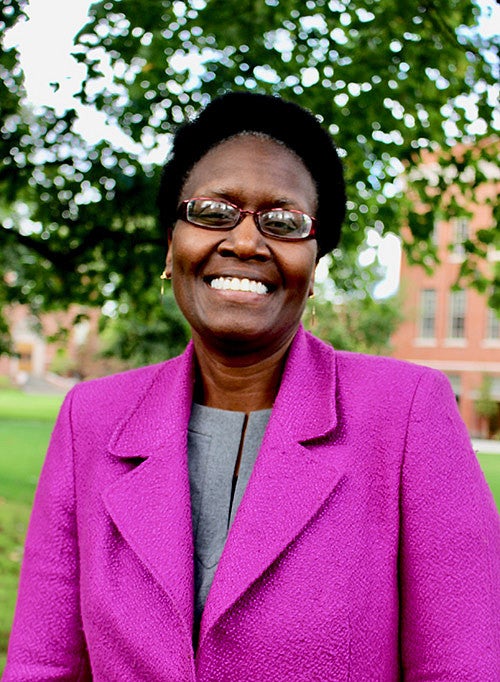
Yvette Alex-Assensoh, vice president for the Division of Equity and Inclusion, sees opportunities for Black leadership. In her essay “Highlighting Oregon’s Black Leadership Gains During Black History Month 2020,” she wrote:
“For many in this state, right now represents a renaissance for Black elected officials. Historic moves like the election of Justice Adrienne Nelson to the Oregon Supreme Court serve as an inspiration to future generations. Whether it’s state legislators like Representative Janelle Bynum or City Councilors like Jo Ann Hardesty, Black officials are not just winning high-profile positions, but making waves for equity and systemic change at the same time.
For all intents and purposes, Black judges, legislators, mayors, city councilors, school board members, community college board members, and others are writing a new chapter in Oregon history.”
Listen to Alex-Assensoh’s interview on Women’s History Month.


